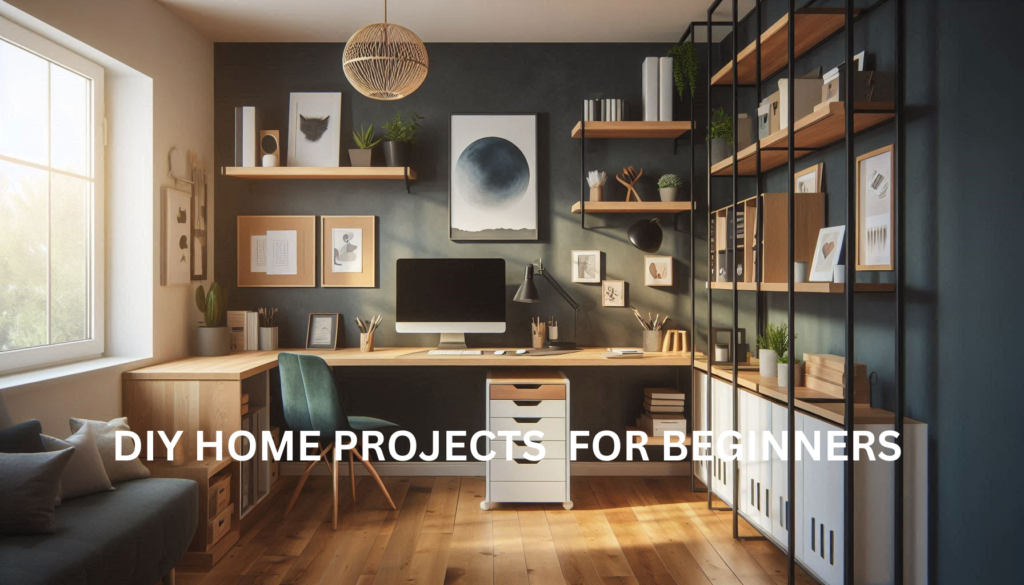Doing your own DIY home projects for beginners can be a great way to improve your living space and save money. But, they can also have some problems, especially if you’re new to it. This guide looks at the good and bad parts of DIY home projects. It gives you helpful tips, shows you some successful examples, and tells you important things to remember to help you do well.
Why Choose DIY Home Projects?
Doing your own DIY home projects For Beginners can be very rewarding. Transforming your space with your own hands gives you a feeling of success and can be a cheaper way to improve things. However, it’s crucial to consider both the advantages and disadvantages before beginning.
Key Benefits of DIY Home Projects:
- Cost Savings: Doing it yourself can cut down on labor expenses, letting you spend more on good materials.
- Personal Satisfaction: Finishing a project on your own gives you a special feeling of pride and accomplishment.
- Customization: DIY lets you make changes that fit your exact tastes and requirements.
Potential Drawbacks:
- Time-Consuming: Home projects usually take more time than planned, especially for those just starting out.
- Risk of Mistakes: Lack of experience can cause mistakes that might be expensive to correct.
- Physical Effort: Doing it yourself involves physical work, which can be tough and tiring.

Simple Wins: Beginner-Friendly DIY Projects
Begin with small projects to boost your confidence and skills. Here are some easy DIY projects that give quick results:
- Painting a Room: Give a space a new look by adding a fresh layer of paint.
- Quote: “One of the easiest and least expensive methods to remodel your house is to paint it. “Home Decor Magazine”
- Installing Shelves: Increase storage and add style by installing easy-to-hang shelves.
- Upcycling Furniture: Make old furniture look new again by painting, changing the hardware, or reupholstering it.
- Creating a Gallery Wall: Show off your favorite pictures and artwork in a well-organized gallery wall.
- Updating Light Fixtures: Replace old light fixtures with modern, energy-saving options.
Key Takeaways:
- Begin with simple tasks to build your skills.
- Pick projects that require few tools and supplies.
- Concentrate on important spaces like living rooms and kitchens.
Big Headaches: Common DIY Challenges
Even though DIY home projects for beginners can be tempting, some of them can cause major problems. Common issues include:
- Inadequate Planning: Not planning ahead can lead to unfinished projects and wasted materials.
- Improper Tools: Using the incorrect tools can cause frustration and poor outcomes.
- Underestimating Costs: Unexpected costs can make DIY projects more expensive than hiring someone.
- Time Management Issues: Not allowing enough time can throw off your schedule.
- Safety Risks: Not knowing safety rules can result in accidents and harm.
Case Study: The Kitchen Renovation Nightmare
- Background: Jane, who is new to doing things herself around the house, decided to update her kitchen on her own.
- Challenges: She ran into unexpected problems with the plumbing and electrical systems, which caused delays and made the project more expensive.
- Outcome: Jane had to hire experts to finish the job, which ended up costing twice as much as she originally planned.
Key Takeaways:
- Plan carefully and think about possible problems.
- Make sure you have the right tools and knowledge.
- Include extra time and money for unexpected issues.
Expert Tips for Successful DIY Projects
To avoid common mistakes in DIY projects, use these professional suggestions:
- Research Thoroughly: Learn about the project before you begin. Watch videos, read guides, and ask experts for advice.
- Create a Detailed Plan: List each step, collect all materials, and set a schedule.
- Invest in Quality Tools: High-quality tools can greatly improve how easy and well your work turns out.
- Start Small: Practice your skills on smaller tasks before doing big changes.
- Know When to Seek Help: Understand when a project is too difficult for you and think about hiring someone who knows more.
Quote: “Being ready and knowing what to do are the main things that lead to success in do-it-yourself projects. Always think ahead and don’t hesitate to get help when you need it.” – DIY Expert Magazine
Impact of DIY Home Projects on Learning and Development
Doing your own home projects can really help you grow as a person and learn new skills. Here’s why:
1. Problem-Solving Skills
Doing DIY home projects for beginners means dealing with unexpected problems and challenges. This helps you learn to think carefully and find good solutions. For example, if you run into a problem with the structure while making a bookshelf, you need to look at the situation, figure out possible fixes, and choose the best one to use.
Key Takeaway: DIY projects help you learn important problem-solving skills that can be useful in many different parts of life.
2. Creativity Boost
DIY home projects for beginners usually require creative thinking and innovation. Whether you’re using old things in a new way of making a special piece of furniture, DIY helps you think in different ways. This creative activity can be a nice change from your usual tasks and might give you new ideas for other parts of your life.
Case Study: Upcycling Pallets into Garden Furniture
- Background: Sarah wanted to make outdoor seating without spending a lot of money.
- Process: She looked into ways to reuse wooden pallets.
- Outcome: Sarah made nice and useful garden furniture, showing her creativity and ability to save money.
Key Takeaway: DIY projects encourage creativity, resulting in special and customized home improvements.

3. Technical Skills
Using DIY tools and materials helps you get better at technical tasks. When you’re just starting, you learn how to use different tools, know more about materials, and try out various methods. As you practice, these skills get better, allowing you to confidently work on more difficult projects.
Quote: “Using tools and materials not only makes you better at technical skills but also helps you understand how things work.” – DIY Enthusiast Magazine
Key Takeaway: DIY projects help you develop technical skills, making you more capable of taking care of and improving your home on your own.
4. Confidence Building
Finishing a self-esteem project makes you feel better about yourself and more confident. The feeling of success from turning your thoughts into real things makes you believe in your skills. This new confidence can help you in other parts of your life, making you want to try new things.
Case Study: Transforming a Basement into a Home Office
- Background: Mark wanted to turn his empty basement into a useful home office.
- Process: He studied how to install drywall, do electrical work, and design interiors by watching online videos.
- Outcome: Mark successfully changed his basement, which made him feel more confident about doing other home projects in the future.
Key Takeaway: DIY home projects for beginners can make you feel more confident, helping you take on different and new challenges.
5. Family Bonding
DIY home projects for beginners can help you get closer to your family. When you work on a project together, it helps everyone learn teamwork and talk to each other. It’s also a chance to teach kids important skills and make them feel good about what they’ve done.
Quote: “DIY projects make families stronger by giving them fun times and special memories.” – Home Improvement Today
Case Study: Building a Treehouse
- Background: The Smith family wanted to create a treehouse for their kids.
- Process: They worked together to plan, design, and build the treehouse over a few weekends.
- Outcome: This project gave the kids a fun place to play and helped the family grow closer while teaching the children about teamwork and simple building skills.
Key Takeaway: Doing projects together at home is a great way for families to bond and learn new skills.
Benefits of DIY Home Projects
Besides the skills and community benefits we’ve talked about, there are many other important reasons to do DIY home projects:
Financial Savings
1. Cost-Effective Solutions DIY home projects for beginners can save a lot of cost-effective compared to hiring someone else. By finding materials on your own and spending time learning and doing the work, beginners can save a lot of money. This is really helpful for people who have a small budget or want to get the most out of their home improvements.
Example: Putting in a backsplash in your kitchen by yourself can save you hundreds of dollars compared to hiring someone to do it.
Key Takeaway: DIY projects provide a budget-friendly option compared to hiring professionals, enabling substantial financial savings.
Personal Satisfaction
1. Sense of Accomplishment Finishing a DIY home projects for beginners gives you a great feeling of personal pride. The hard work and commitment you put into making something yourself lead to a real sense of success. This achievement can improve your overall happiness and give you a lasting sense of satisfaction in what you’ve done.
Quote: “Knowing that you completed a thing entirely on your own is the best feeling in the world. – Do-it-yourself enthusiast
Key Takeaway: Doing your own projects gives you a big feeling of pride and sense of accomplishment, which makes you happier and healthier overall.
Customization and Personalization
1. Unique and Personalized Touch DIY home projects for beginners give you the freedom to make things exactly how you want them. Unlike things you buy or have installed by professionals, DIY items can be made to match your exact needs, likes, and look. This special touch makes your home feel more like you, making it truly yours.
Example: Shelves you build yourself that fit perfectly into a tricky corner in your living room.
Key Takeaway: DIY projects let you create unique and personalized home changes that show off your own taste and style.

Lifelong Learning
1. Continuous Learning and Growth DIY home projects for beginners helps you keep learning and improving your skills development. When you try new projects, you learn new methods, gain more knowledge, and get better at what you do. This ongoing learning process keeps your mind sharp and can give you a deeper sense of satisfaction.
Case Study: Learning to Install Electrical Fixtures
- Background: Alex had never done any electrical work before, but he wanted to put in new lights at his house.
- Process: He learned by taking online classes, watching videos, and asking advice from people who know about electricity.
- Outcome: Alex managed to set up the lights, and in the process, he learned a lot and felt more confident about working with electricity.
Future of DIY Home Projects for Beginners
The future of DIY home projects for beginners is set to be both thrilling and revolutionary. With new technology, expanding online groups, and more focus on being eco-friendly, the world of DIY home improvement is changing in big ways.
Technological Advancements
1. Smart Tools and Devices New technology is making it easier and simpler to do DIY projects. Smart Tools, have sensors, connect to other devices, and are easy to use are changing how people who like DIY home projects for beginners. These tools help with accuracy, speed, and ease of use, so even beginners can get results that look professional.
Example: Smart drills and saws that have built-in levels and measurements, and 3D printers for making custom parts and fixtures.
Key Takeaway: Using smart tools will let beginners try more complicated projects with more confidence and better results.
2. Augmented Reality (AR) and Virtual Reality (VR) Augmented Reality (AR) and Virtual Reality (VR) are expected to change how people plan and do DIY home projects for beginners. AR can show digital instructions on real objects, helping users see and follow steps easily. VR can offer interactive lessons and practice sessions, letting beginners try out skills in a virtual space before using them in real life.
Example: AR apps can display virtual furniture in a room to help plan the layout, while VR can simulate carpentry or plumbing tasks for practice.
Key Takeaway: AR and VR will make learning easier and reduce mistakes in DIY projects, making them more approachable for beginners.
Growing Online Communities
1. Collaborative Learning and Sharing The rise of online communities and social media sites focused on DIY home projects for beginners has built a large collection of information and help. Newcomers can find guides, ask for advice, and show their work to people all over the world. These groups encourage a helpful atmosphere where members can learn from each other and get suggestions and support.
Example: YouTube channels, DIY discussion boards, Pinterest pages, Instagram profiles featuring DIY projects.
Key Takeaway: Online groups offer useful tools and support, assisting beginners in solving problems and keeping them inspired during their projects.
2. Crowdsourcing Ideas and Solutions Platforms that allow people to share ideas and solutions are getting more and more popular. Users can share their project plans or issues, and get help from a wide range of people with different skills. This teamwork can lead to creative solutions and better project results.
Example: Websites like Reddit’s r/DIY, where users share project ideas and solutions, or Instructables, where users can post detailed guides and receive feedback.
Key Takeaway: Crowdsourcing ideas and solutions will lead to more creative and effective DIY projects, especially for beginners who can benefit from collective wisdom.
Emphasis on Sustainability
1. Eco-Friendly Materials and Practices There is a growing emphasis on sustainability in DIY home projects. Beginners are increasingly opting for eco-friendly materials and practices, such as using reclaimed wood, low-VOC paints, and energy-efficient fixtures. This shift is driven by a heightened awareness of environmental issues and a desire to reduce the ecological footprint of home improvement activities.
Example: Projects that incorporate upcycling old furniture, using solar-powered tools, or installing water-saving fixtures.
Key Takeaway: Sustainable DIY home projects for beginners will become the norm, as more beginners seek to create environmentally friendly home improvements.
2. Green Building Techniques Green building techniques are becoming more accessible to DIY home projects for beginners. Resources and guides on energy-efficient building methods, passive solar design, and sustainable landscaping are readily available online. Beginners can incorporate these techniques into their projects, contributing to a more sustainable future.
Example: Installing green roofs, building rain gardens, or using natural insulation materials.
Key Takeaway: Green building techniques will empower beginners to create eco-friendly homes, aligning their DIY home projects for beginners with broader sustainability goals.
Conclusion
DIY home projects for beginners provide a mix of small successes and possible difficulties. For those new to this, starting with easy projects can help build confidence and skills. Although challenges are bound to happen, careful planning, the right tools, and reasonable expectations can help solve many problems. Doing DIY home projects for beginners not only improves your home but also offers valuable learning opportunities and personal development. As we enter 2024, adopting new trends and technologies will give DIY fans more power to design, innovate, and change their living spaces.
FAQ for DIY Home Projects for Beginners
1. What are the easiest DIY home projects for beginners?
- Painting a room
- Installing shelves
- Upcycling furniture
- Creating a gallery wall
- Updating light fixtures
2. How can I avoid common DIY mistakes?
- Plan thoroughly
- Use the right tools
- Research before starting
- Allow extra time and budget
- Know when to hire a professional
3. What are the benefits of DIY home projects for beginners?
- Cost savings
- Personal satisfaction
- Customization
- Skill development
4. Are there any risks involved in DIY projects?
- Time-consuming
- Potential for mistakes
- Physical effort
- Safety risks
5. How can I learn more about DIY home projects for beginners?
- Online tutorials
- Home improvement blogs
- Virtual workshops
- DIY communities
6. What tools do I need for DIY home projects for beginners?
- Basic toolset (hammer, screwdrivers, pliers)
- Power drill
- Measuring tape
- Level
- Safety gear (gloves, goggles)
